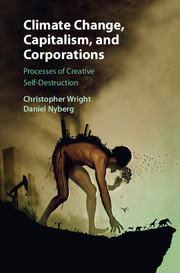Book contents
- Frontmatter
- Dedication
- Contents
- List of figures
- List of tables
- Foreword
- Acknowledgements
- 1 Climate change and corporate capitalism
- 2 Creative self-destruction and the incorporation of critique
- 3 Climate change and the corporate construction of risk
- 4 Corporate political activity and climate coalitions
- 5 Justification, compromise, and corruption
- 6 Climate change, managerial identity, and narrating the self
- 7 Emotions, corporate environmentalism, and climate change
- 8 Political myths and pathways forward
- 9 Imagining alternatives
- Appendix
- References
- Index
8 - Political myths and pathways forward
Published online by Cambridge University Press: 05 October 2015
- Frontmatter
- Dedication
- Contents
- List of figures
- List of tables
- Foreword
- Acknowledgements
- 1 Climate change and corporate capitalism
- 2 Creative self-destruction and the incorporation of critique
- 3 Climate change and the corporate construction of risk
- 4 Corporate political activity and climate coalitions
- 5 Justification, compromise, and corruption
- 6 Climate change, managerial identity, and narrating the self
- 7 Emotions, corporate environmentalism, and climate change
- 8 Political myths and pathways forward
- 9 Imagining alternatives
- Appendix
- References
- Index
Summary
One of the penalties of an ecological education is that one lives alone in a world of wounds. Much of the damage inflicted on land is quite invisible to laymen. An ecologist must either harden his shell and make believe that the consequences of science are none of his business … or he must be the doctor who sees the marks of death in a community that believes itself well and does not want to be told otherwise.
(Leopold, 1966: 183)As Aldo Leopold has argued, those of us attuned to environmental degradation do, indeed, live in a ‘world of wounds’. The relentless expansion of global capitalism has accentuated humanity's ecological impact to the extent that we are now fundamentally reshaping ecosystems and the very climate of the planet in disastrous ways. For those aware of the worsening climate crisis there is a sense of unreality about the situation as people go on with their busy lives, apparently oblivious to the looming catastrophe.
In the prosperous ‘First World’ a bevy of advertising encourages us to pursue our dreams of rewarding careers, affluent lifestyles, and the insatiable consumption of ‘necessities’. We think nothing of hopping on a plane to travel to a remote holiday destination, eating gourmet food, possessing the latest smartphone or technical gadget, or aspiring to a luxury car or designer home. Yet this model of economic normality comes at an astronomical environmental cost. The ‘marks of death’ are searingly evident in ever-escalating GHG emissions, deforestation, polluted waterways, species extinction and acidifying oceans. Political, media, and business discourses proclaim all is well and turn a deaf ear to the scientists and activists who highlight the folly of our madness. Denial of a very basic kind lies at the heart of our engagement with climate change.
In 2008, when we embarked on our research, there appeared some hope that the world's political leaders had at last recognised the need for a coordinated response to mitigating GHG emissions. Nicholas Stern (2007) had produced his influential economic analysis, emphasising the urgency of tackling the greatest market failure of all time. Political and business momentum seemed directed towards collective global action. There was a genuine expectation that the following year's Copenhagen climate talks would culminate in a game-changing global agreement and an acceleration towards low-carbon economic reinvention.
- Type
- Chapter
- Information
- Climate Change, Capitalism, and CorporationsProcesses of Creative Self-Destruction, pp. 164 - 184Publisher: Cambridge University PressPrint publication year: 2015



